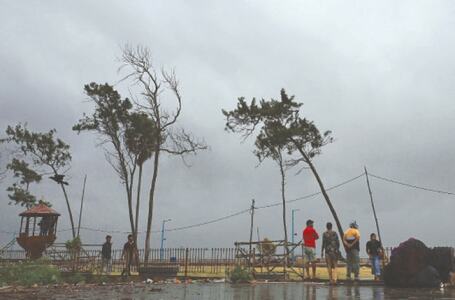
• Govt declares three-day mourning
• Damaged telephone networks, flooded roads hamper rescue work
• Some 155,000 homes without electricity
SEDAV: Spanish rescuers on Wednesday scrambled to save people trapped by surging tides of muddy water in floods that killed at least 95 people, tossed cars and wreaked transport havoc.
Prime Minister Pedro Sanchez urged citizens to remain vigilant as the danger persisted and three days of mourning were declared in the European nation’s worst such disaster in more than 50 years.
Heavy downpours and fierce winds have lashed Spain since the beginning of the week after a storm formed over the Mediterranean Sea, with up to a year’s worth of rain falling in just hours in some areas.
The body coordinating emergency services in the eastern Valencia region announced a provisional death toll of 92, adding that bodies were still being recovered and identified.
Two people died in neighbouring Castilla-La Mancha and another victim was reported in Andalusia in the south, both regions’ leaders told journalists.
The toll is likely to rise because “there are many missing people”, government minister Angel Victor Torres told public broadcaster TVE.
A sea of piled-up cars and mud swamped streets in Sedavi, a suburb of the Mediterranean coastal city of Valencia.
Stunned residents attempted to clean the sludge and grabbed buckets to bail out water from their homes ahead of a long night without water or electricity.
In Ribarroja del Turia on the outskirts of Valencia city, town councillor Esther Gomez said workers were stuck overnight in an industrial estate “without a chance of rescuing them” as streams overflowed.
“It had been a long time since this happened and we’re scared,” she told AFP.
According to Spain’s weather service AEMET, the town of Chiva, west of Valencia, recorded 491mm of rain in just eight hours on Tuesday — almost equalling a year’s worth.
‘Spain weeps’
Sanchez said the government’s “absolute priority” was to help the victims.
“All of Spain weeps with all of you… We won’t abandon you,” he said in a televised address.
The disaster could not be considered over and “we will deploy all the necessary resources for as long as necessary so that we can recover from this tragedy,” he added.
King Felipe VI said he was “devastated” by the news on X and offered “heartfelt condolences” to families of the victims, thanking emergency services for their “titanic” response.
Damage to telephone networks and flooded roads were hampering efforts to reach stricken communities in the Valencia region.
Some 155,000 homes are without electricity in Valencia region due to the storm, energy company Iberdrola said, adding that it had dispatched 500 workers to restore power there.
Defence Minister Margarita Robles told reporters more than 1,000 troops backed by helicopters were being deployed in the face of “an unprecedented phenomenon”.
The European Union activated its Copernicus satellite system to help coordinate Spanish rescue teams, commission chief Ursula von der Leyen told a news conference in Brussels.
The bloc has also offered to use its civil protection mechanism to send further reinforcements, she said.
‘Unprecedented phenomenon’
Officials in the Valencia region announced survivors were being sheltered in temporary accommodation such as fire stations.
Rail and air transport remained severely disrupted. The high-speed line between Valencia and Madrid will remain suspended over the next four days at least, rail infrastructure authority Adif announced.
The downpours are expected to continue. AEMET issued a red alert for heavy rains in the countryside near the southern coastal city of Cadiz and rough weather was expected in the northeastern region of Catalonia.
The flood toll is Spain’s deadliest since 1973 when at least 150 people were estimated to have died in the southeastern provinces of Granada, Murcia and Almeria.
Meteorologists have said the latest storm was caused by cold air moving over Mediterranean’s warm waters, which produced intense rain clouds, a phenomenon common for the time of year.
Scientists warn extreme weather events such as storms are becoming more intense, last longer and occur more frequently as a result of human-induced climate change.
Such extremes “can overwhelm the ability of existing defences and contingency plans to cope, even in a relatively wealthy country like Spain”, said Leslie Mabon, senior lecturer in environmental systems at Britain’s Open University.
Published in Dawn, October 31st, 2024















































Dear visitor, the comments section is undergoing an overhaul and will return soon.